Given the changes in US policy, both East Asia and Europe face a common question: How credible is America's nuclear security assurance? Against this background the Korean Research Institute for Security Affairs, the Konrad Adenauer Foundation, and the Federal Academy for Security Policy invited nuclear policy experts to a conference in Seoul.
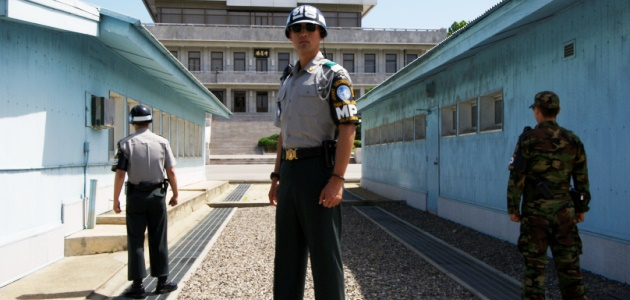
North Korea and South Korea have been facing each other as opponents for 65 years.
The Panmunjeom site where the ceasefire was negotiated in the early 1950s is a most visible reminder of the persistent confrontation. Picture: U.S. Army/Johnson
The crisis surrounding North Korea’s nuclear programme could soon be defused. North Korea’s leader Kim Jong-un has announced that the Punggye-ri nuclear test site will be closed at the end of May. Kim had already met South Korean President Moon Jae-in for direct talks at the end of April, and a meeting with US President Donald Trump has been scheduled for mid-June. Is the North Korean regime opening up? Periods of thaw and summit diplomacy may be nothing new between South and North Korea. This time, however, it can be cautiously assumed that they may lead to real improvements in the relations between the two opposing countries. It was against this background that representatives of German and Korean ministries, security institutions and the science sector followed an invitation by the Korean Research Institute for Security Affairs (RINSA), the Konrad Adenauer Foundation and the Federal Academy for Security Policy to meet in Seoul on 10 May 2018 to discuss the challenges of nuclear deterrence.
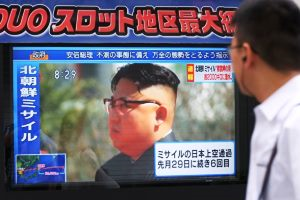
The Korea nuclear crisis affects the entire East Asian region. Here, Japanese TV is reporting on a North Korean missile test.
Picture: 禁书 网/Flickr/CC BY-NC-ND 2.0
It is quite obvious that a European-Asian dialogue on nuclear deterrence is necessary, as nuclear weapons play a role in both regions. Europe and NATO are experiencing a renaissance of nuclear deterrence. After Russia’s rejection of the European security order with its aggression against Ukraine and repeated nuclear threats against countries such as Denmark, Russia is now seen as a threat by its western neighbours. In Asia, the issue of deterrence has never been off the table due to the many nuclear powers in the region. As a result of North Korea’s nuclear ambitions and the aggressive rhetoric used by Trump and Kim, the issue has now gained added urgency.
Ready to sacrifice Chicago for Frankfurt: extended deterrence requires credibility
But there is more to the issue than supposed "nuclear buttons" on desks. In both regions, the concept of extended deterrence is at stake. It is according to this concept that the United States, as a nuclear power, has provided security guarantees for its non-nuclear allies in Europe and Asia. This means both regions are confronted with the fundamental credibility problem of extended deterrence: how credible is a security guarantee given by a protector if, once he throws himself into the breach for one of its partners, he must then expect nuclear retaliation by the attacker? The familiar question from the Cold War whether somebody would be prepared to sacrifice Chicago for Frankfurt can also be applied to the current situation in Asia and Europe.
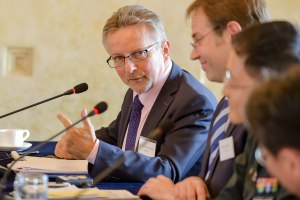
"Security assurances, both nuclear and conventional, must always be unconditional if they are to achieve the intended effects", BAKS President Dr Karl-Heinz Kamp writes in his report.
Picture: Konrad Adenauer Foundation.
Moreover, both regions are confronted with the changes in the policy of the United States towards its allies under President Trump. By imposing conditions for the security guarantees, such as political concessions or financial contributions, the new US President is undermining the credibility of extended deterrence because security assurances, both nuclear and conventional, must always be unconditional if they are to achieve the intended effects of deterrence and reassurance with allies and opponents.
Nuclear arms remain political reality
- both in Asia and in Europe
In any case, both regions are also facing problems in gaining public acceptance for the concept of nuclear deterrence. This is unsurprising in view of the difficult dilemmas associated with this concept. Nuclear deterrence can prevent conflicts by threatening unacceptable damage. However, it must not be allowed to fail, because the consequences of using nuclear weapons would be disastrous. Public criticism has been intensified by claims that a world free of nuclear weapons could be achieved in the foreseeable future, if only there were the political will to do so. Nobody is questioning that a world free of nuclear weapons would be preferable, and that complete nuclear disarmament should remain a long-term objective. In the foreseeable future, however, a world free of nuclear weapons will remain an illusion. Instead, nuclear weapons will continue to play a role in international politics. In this sense, they also reflect the tense relations among the states, which is why the problem of nuclear deterrence cannot be completely removed from the discussion.
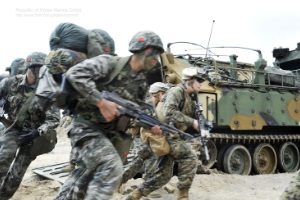
South Korean and US armed forces regularly conduct joint exercises, as pictured here. However, involvement in nuclear planning, like in NATO, does not exist in that region. That is why South Korean experts see considerable uncertainty about US assurances. Picture: Republic of Korea Marine Corps.
The Korean conversation partners in particular expressed concern that the issue of credibility is even more acute in their country than in the European context. Irrespective of which government was in power in the US, extended deterrence in Europe has always been based on three pillars: the presence of US nuclear weapons on the European continent, the participation of NATO members in US nuclear planning, and a programme of joint exercises involving nuclear procedures. These benefits do not apply to the Asian countries under the US nuclear umbrella, however, which is why there was considerable uncertainty about the viability of US assurances in that region.
Would Kim's regime survive even a careful opening-up?
Giving the partners a greater influence in US deterrence policy was also necessary if the current thaw in the relations between North and South continues and the North Korean nuclear threat can be reduced. The experts stated that, irrespective of the current decisions, it would take years before steps towards nuclear disarmament could be implemented and verified. At the moment, it was not even known exactly which nuclear capabilities North Korea has or how verification measures in the most secretive state in the world could be carried out. It is also unclear whether the regime would survive even a careful opening-up or a reduction of the pressure being exerted on its own population. The mood in South Korea is therefore far from euphoric, despite the signals recently sent out by North Korea.
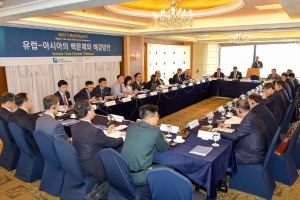
The conference brought together both Korean and German experts from government, security institutions and the science sector.
Picture: Konrad Adenauer Foundation.
If the current thaw in relations should once again fail, some of the Asian conversation partners did not rule out that South Korea would need to leave the Nonproliferation Treaty (NPT), at least temporarily, so as to procure a small arsenal of nuclear weapons. The German side underlined the risk involved in this course of action, pointing out that it would not only send a signal of deterrence to North Korea, but may also be seen as a threat by neighbouring countries such as Japan and China, with unforeseeable consequences for the stability of the region.
It is remarkable that the US was outspokenly criticised at the conference, despite Washington’s claim that it facilitated the opening between the two Koreas. Its preparations for the summit between the US and North Korea, for instance, were referred to as “requiring much improvement”, and President Trump’s withdrawal from the nuclear agreement with Iran was diplomatically described as only having a “limited value”. The discussions, which were conducted with great openness, also showed the importance of such an exchange. Participants from both regions acknowledged that uncomfortable questions arising in connection with nuclear deterrence can neither be postponed any longer, nor can be discussed behind closed doors.
Author: Karl-Heinz Kamp
